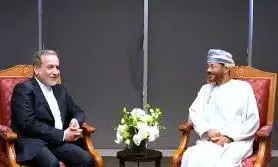
Iran, U.S. agree to resume nuclear talks next week after “constructive” first round in Oman
text_fieldsThe United States and Iran have agreed to continue their nuclear negotiations next Saturday, April 19, following what both sides described as a “constructive” first round of indirect talks held in Muscat, Oman.
Iranian Foreign Minister Abbas Araghchi confirmed the development in an interview with Iranian state television, where he also revealed that four rounds of indirect message exchanges occurred during the discussions, mediated by Oman. In a rare move, Araghchi and U.S. Mideast envoy Steve Witkoff briefly interacted in person at the end of the talks, according to Iranian media - signaling a potential thaw in decades of diplomatic deadlock.
The initial meeting began around 3:30 p.m. local time and lasted for just over two hours in a secluded location outside Muscat. Convoys believed to be carrying Witkoff and Araghchi were seen entering and leaving the venue, and the U.S. diplomat’s car later returned to Muscat, disappearing into city traffic near the U.S. Embassy district.
While American officials have not yet publicly confirmed the meeting or its outcomes, Iranian officials appeared eager to frame the encounter positively ahead of any possible public reaction from former President Donald Trump. Trump has repeatedly threatened military action if Iran’s nuclear program is not curtailed.
Iranian Foreign Ministry spokesperson Esmail Baghaei described the talks as indirect but “genuine,” saying they were focused solely on nuclear matters and the lifting of sanctions. “We are giving diplomacy an honest chance to protect Iran’s national interests,” he said. “This is only the beginning. It’s natural that each side used this round to express foundational positions.”
Speaking to reporters, Araghchi emphasised that any future progress would require political will from both nations. “The talks are indirect, and focused only on the nuclear file. If mutual intent exists, we will set a timetable. But it's still early for that,” he said in audio released by IRNA.
The U.S., meanwhile, has reiterated that the dismantling of Iran’s nuclear program remains a key demand. In an earlier interview, Witkoff said, “Our position begins with dismantlement. There can be no weaponisation of Iran’s nuclear capabilities.”
The central points of contention remain unchanged: Iran seeks relief from crippling economic sanctions, while the U.S. aims to limit Iran’s uranium enrichment, which currently exceeds the levels allowed under the 2015 nuclear deal. Iran now possesses uranium enriched to 60% - just a step away from weapons-grade material - and is unlikely to agree to return to the 3.67% limit set in the original agreement.
The idea of a full dismantlement, similar to what was attempted in Libya, is considered a non-starter in Tehran. Iranian leaders have often cited the fate of Libya’s Muammar Gadhafi - killed by rebels in 2011 despite giving up his nuclear program - as a cautionary tale about trusting Western powers.






